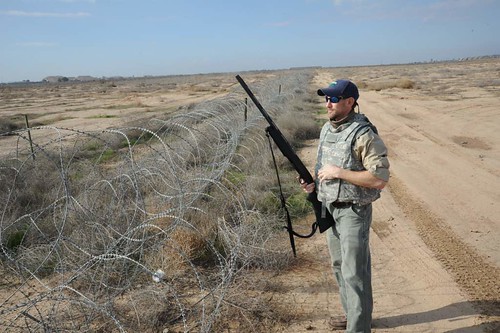
After a rather interesting C-130 tactical landing to avoid enemy fire, my first sight of Iraq was at night. My first thought was how far I was from home, but a gaze upward revealed familiar stars and constellations. I felt relieved knowing that I was still indeed on planet Earth--even after traveling for 50 hours.
I was on a military base surrounded by some pretty hostile territory and received immediate training on procedures to follow in the event of an Indirect Fire (IDF) attack. This was my welcome to Mortaritaville, a nickname given to Joint Base Balad (JBB) due to the daily barrage of IDF mortar and rocket attacks over the years.
The next days were spent learning the base. It became clear that mitigating wildlife hazards was going to pose unique challenges. For instance, in the States, I never really concerned myself with sniper fire while working! And in Iraq, the possibility always exists of stumbling upon Unexploded Ordinances (UXO’s), fired rockets and mortars that failed to detonate.
Don’t assume there is little wildlife here in this desert. The ancient Tigress River runs within a half-mile of the east perimeter fence, giving life to this desolate land. Agricultural fields dominate as far as the eye can see. Local Iraqis grow and survive on almost every fruit or vegetable imaginable but how they keep any of their grain crops for themselves, I cannot fathom. Tens of thousands of wood pigeons, rock doves, and collared doves relentlessly feed in those fields.
And then there are the rooks, a migratory crow-like bird present here during the fall and winter months. When these birds leave and return to their Tigress River roost sites, there is no better term to describe the sheer number other than “biblical.” Imagine the devastating impact of a flock of over a million crow-sized birds. If this was occurring back home, Wildlife Services would be helping these farmers with the depredation. If allowed to travel outside the wire to conduct direct control activities, I would be helping farmers increase their harvest, while managing wildlife/aircraft strike threats at the same time. Perhaps one day, but for now, such assistance is impossible.
One cannot dwell on the dangers, or you could never appreciate this land’s beauty It’s magical being in the birthplace of mankind. Lands surrounding Balad are an oasis in the desert; fertile soil grows lush green crops in fields divided by rows of eucalyptus and evergreen trees. I cannot imagine any place with more impressive sunrises and sunsets. At these special times, you forget that you are in a desert far from home.
Keeping JBB’s airfields free of birds helps pilots and other servicemen complete the mission and return home safely, which is vital for the success of Operation New Dawn and the future of Iraq. Wildlife Services is committed to our role in this enormous cause.
John (J.C.) Griffin, USDA wildlife biologist at Moody Air Force Base, GA, volunteered for assignment at Joint Base Balad, Iraq, arriving in November. At either base, his work revolves around reducing hazards and risks to military aviation posed by wildlife, primarily birds.
